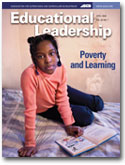Our cover child this month is 8-year-old Davinia Sparks, a 2nd grader who attends a Southside Chicago school. She's a great kid who wants to be a lawyer or a model, our photographer tells us.
This month she's representing all the children who have great dreams and great potential, and who live in impoverished circumstances. Approximately 36.5 million people in the United States live in poverty. About 35 percent (12.8 million) of them are under 18 years old (U.S. Census Bureau, 2006). Globally, half the world's population live in poverty, and more than 1.1 billion live in extreme poverty—at subsistence level, making under $1 a day (Rice, 2008).
Sociologists and economists can debate to their hearts' content all the issues revolving around poverty—what causes it; what evils coexist with poverty (disease, despair, crime, unrest, early death); where we should put resources to combat it; and just what a government's role should be in creating a society where fewer people must live in poverty.
This issue of Educational Leadershipdoesn't discuss all those things, but it does look intently at two questions. How does poverty affect learning, and what can educators do to enhance the well-being and improve the achievement of those students whose families have the fewest economic resources?
Richard Rothstein (p. 8) begins our issue by advocating pursuing both school and socioeconomic improvements simultaneously. Social and economic reforms are needed to create an environment in which the most effective teaching can take place, he writes. And modest reforms—housing subsidies, dental care in school-based clinics, after-school programs, higher-quality early childhood care—together with school reforms—could lead to the higher achievement of those who start school with, on average, poorer health, less stability, and fewer enriched experiences than their higher-income peers do.
As he notes here, Rothstein has his critics, some who believe that educators should stick to recommending school reforms and not call for improved housing, medical care, and economic policies. But Rothstein makes a persuasive argument that indeed he is not "offering excuses" when he writes,We are all citizens in this democracy, and educators have a special and unique insight into the damage that deprivation does to children's learning potential. If educators who face this unfortunate state of affairs daily don't speak up about it, who will?
Kati Haycock and Candace Crawford (p. 14) of the Education Trust, a reform group noted both for its optimism that schoolscan improve the lot of impoverished students and for excoriating those who stray from the message about the need to start with the schools, make their case here that good teaching is at the heart of improving achievement for those most at risk.
The research points to the fact that minority and poor students in particular are typically taught by more than their fair share of unlicensed, out-of-field, and inexperienced teachers. Haycock and Crawford urge administrators to look at the data in their own districts on turnover, out-of-field teaching, and years of experience. Gaps in teacher quality are a big contributor to gaps in student achievement, they write, and we need to investigate and implement ways—from incentives, to class size, to fixing the bathrooms—to attract strong teachers to the poorest schools. "We've known for years that education has real power to change lives for the better," they write. "It's time we step up and harness that power to help close the gaps that consign so many of our students to live on the —s."
Other writers in this issue point to promising policies, programs, and practices that make big differences in the quality of students' lives and school experiences. Some, like full-service schools (pp. 38 and 44), require partnerships with other community agencies. Others, like special teacher-recruitment programs (p. 25), require both an increase and a change in allocation of resources. Some, like a program that gives students more access to books during the summer (p. 20), can have tremendous benefits by simply recognizing a need and coordinating available resources.
Quite a few approaches require an attitude change: Poor people, like their richer counterparts, resist disrespect and condescension. Most of all, these efforts require a renewed commitment to seeing the invisible poor around us. If we do make this commitment, we will help our students live up to their potential, and by doing so, perhaps we will live up to our own.
If we forget why we must try, read the words that Socrates voiced several thousand years ago:Fellow citizens, why do you turn and scrape every stone to gather wealth, and take so little care of your children, to whom one day you must relinquish it all?


